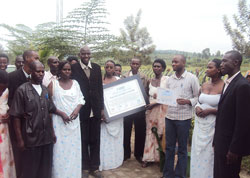GATSIBO/NYAGATARE-276 maize farmers in Nyagatare and Gatsibo districts completed a three-week training in post-harvest handling and storage skills.Participants were representatives drawn from 9 maize Cooperatives in Nyagatare and Gatsibo districts.


GATSIBO/NYAGATARE-276 maize farmers in Nyagatare and Gatsibo districts completed a three-week training in post-harvest handling and storage skills.
Participants were representatives drawn from 9 maize Cooperatives in Nyagatare and Gatsibo districts.
Post-Harvest Handling and Storage (PHHS) is a United States Agency for International Development (USAID) project, implemented by CARANA Corporation.
According to Jean Marie Vianney Hitayezu, a training specialist with PHHS, the project has so far trained maize farmers representing 19 maize and bean cooperatives in the Eastern Province.
"We trained all maize farmers’ cooperatives in the province. Our main target is to facilitate the government to improve its food security, linking maize producers with surpluses of staple crops to markets,” he said.
During the training, farmers visited the country offices of World Food Programme where they were practically trained in food storage and handling.
"They acquired hands-on skills at WFP offices and we hope that they improved in the above fields”.
John Sesonga, who represented WFP at the graduation ceremony held in Rukomo Sector, challenged the trainees and urged them to become role models in maize production.
"I want to assure you that maize produced in Washington, New York and many other places is not different from what is produced here in Nyagatare. But the most important thing is how you handle and store it. It is your turn to practice what you got from the training to become role models in maize production,” he said.
Damascene Ntunzwenimana, who represented the trainees, said that the skills they acquired will improve the quality of their production.
"To tell you the truth, I once lost six tons of maize due to poor storage. But with this training, it has become a thing of the past,” he said.
Ends




